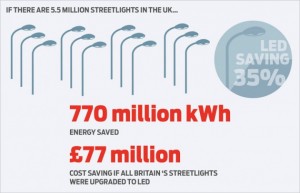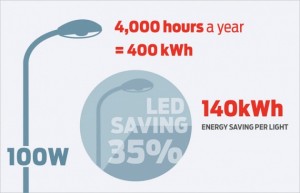What if the UK’s 5.5 million streetlights were converted to LED? I reckon local authorities, government bodies and the Highways Agency would save about 770,000,000kWh a year and prevent the emission of 430,000 tonnes of carbon dioxide.

To calculate efficiency I have compared a number of LED replacement options. For example, the Light Efficient Design 35W LED luminaire will replace a 55W SOX and represents a 36 per cent saving. Some manufacturers claim higher savings, but I have assumed a saving of 35 per cent. This does not allow for gear losses, but even without this percentage the scale of the estimated energy saving is significant.
One 100W streetlight operating for 4,000 hours a year, replaced with LED sources, saves 140kWh a year, assuming a saving of 35 per cent.
Now imagine 5.5 million streetlights each saving 140kWh a year. For local authorities, government bodies and the Highways Agency this is the tip of the iceberg.

The financial savings generated from reduced maintenance are the key to achieving ROI, although many organisations find it difficult to assess maintenance costs accurately.
There is a trend towards turning streetlighting off from midnight, a practice that affects both motorist and pedestrian safety. The introduction of LED technology not only improves energy efficiency but also enables dimming. I am not suggesting that streetlights are dimmed to 10 per cent, the contrasts may be too great, but dimming to 30 per cent will save energy while leaving the area illuminated. There are a number of Wi-Fi systems that will enable lighting control from a central base. Perhaps something streetlighting managers should consider.
A word of warning. I have, on my travels around the country, seen a large number of LED lanterns that are either not operating at all or left on 24/7 (Even during the day!) If an LED is operating 24/7 you are throwing away most of the energy efficiency benefits. Also, there are lanterns that have turned through 90 degrees because of the lantern design. The introduction of LED streetlighting does not mean zero maintenance, some organisations have clearly not read the small print.
Perhaps this is another message for the government.
Check out our range of LEDs designed to replace streetlighting – Click Here To View!
Article courtesy of Dave Tilley – LUX.


